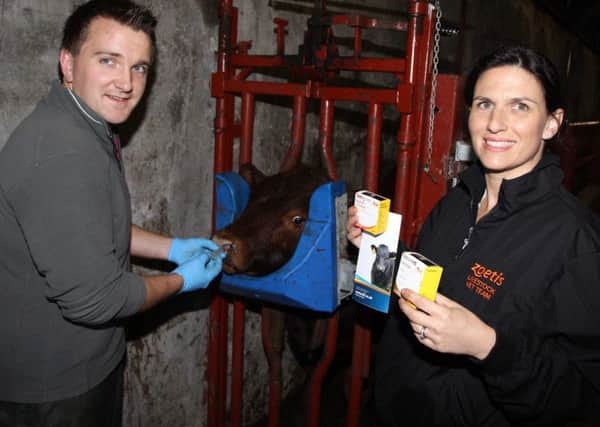Busy farmer and vet signs up for SureCalf®


However this does not deter him from seeking quality in every aspect of his work.
He has just signed up fifteen February born calves for the SureCalf® programme, which he is taking to the weanling sales in Ballymena.
Advertisement
Hide AdAdvertisement
Hide AdSureCalf ® which was introduced to Northern Ireland last year at Ballymena and Enniskillen Marts, was popular with buyers as it ensured that calves did not suffer poor respiratory health due to the stress of weaning, visiting the mart and subsequent transport.
David commented: “In reality I have not done anything that I would not have done prior to the introduction of the SureCalf® programme. I am passionate about animal welfare, constantly wanting to improve quality and efficiency of animals produced, reducing stress and improving animal health on farm. It was really only a matter of calling the SureCalf® Helpline and registering the calves.”
The health protocols on the farm include vaccination of all stock against clostridial disease, vaccination of the cows against BVD and IBR, and injecting the calves with Vitamin E and Selenium when disbudded and tagged.
Regarding the autumn calves they are vaccinated with Rispoval® IntraNasal and Rispoval® IBR Marker live around two months of age, while spring born calves are vaccinated prior to housing with Rispoval® IntraNasal + Rispoval® IBR Marker live.
Advertisement
Hide AdAdvertisement
Hide AdFor parasite control all stock are treated for lungworm and stomach worms in May and the end of June, and treated for fluke, worms and lice at the end of August.
David added: “The calves I am taking to Ballymena under the SureCalf® programme, include both males and females, which were born in February, progeny of one of my two Limousin stock bulls which were bred, via embryo transfer, from the Carmorn Limousin herd belonging to Francis Macauley.
“These calves are currently creep feeding and all of them have been fluked and wormed as well as vaccinated according to the Surecalf ®Duo scheme (Rispoval® IntraNasal in conjunction with Tracherine®.)
“A lot of finishers who purchase calves are vaccinating them when they take the animals home. This is not as effective as vaccinating prior to the stress of transport, mixing with others and encountering the main respiratory viruses IBR, BRSv and PI3v.”
Advertisement
Hide AdAdvertisement
Hide AdAurelie Moralis, Veterinary Consultant with Zoetis points out that sellers can register their calves at least two weeks before sale by calling the SureCalf® Helpline on 0800 668 1886. The information required are the dates of birth of the calves, numbers being sold, the date of vaccination and the batch number of the vaccines used, plus the name of their veterinary practice. They will then receive personalised SureCalf® certificates, with these details. On the day of sale the seller provides the buyer with this signed certificate showing compliance with the SureCalf® programme. The seller will also receive blue ear tags which can be inserted in the calf’s ear and cards for the calf pens, thus identifying the vaccinated calves for the buyers.
There are three schemes within the SureCalf programme, dependant on vaccine used, age of calf, and whether or not it has been through a winter housing period. David’s calves are sold under the SureCalf Duo scheme which requires that calves are over 10 weeks of age, and are vaccinated 1 to 3 weeks prior to sale with a single intranasal dose of Rispoval® IntraNasal (against BRSv and PI3v) and a single intranasal dose of Tracherine®(against IBR).
The buyer benefits from up to six months ongoing cover against IBR and up to three months ongoing cover against BRSv and PI3v ensuring protection going into the winter housing period.